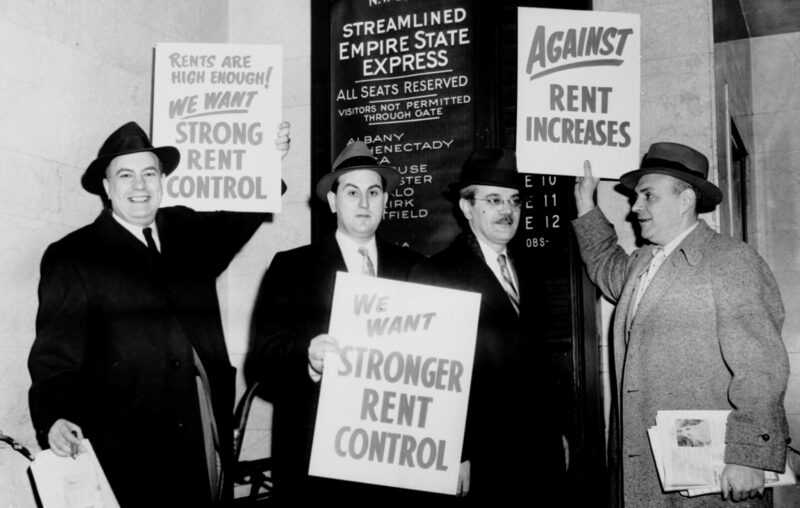Beware of the Ceiling

Image courtesy: International Ladies Garment Workers Union Archive
Any well-taught Econ 101 course offers an exercise to explore the consequences of price ceilings. A price ceiling exists whenever the government prohibits sellers from charging – and buyers from paying – prices higher than the maximum price dictated by government. The purpose and effect of a price ceiling is to push the money price of the good or service whose price is ceilinged below the level this price would reach in the absence of government intervention.
Students in Econ 101 learn that price ceilings impose several unfortunate consequences that presumably are unintended by the governments that implement them, and that certainly are unwelcome by the buyers who are the intended beneficiaries of such government intervention. The chief negative consequence of any price-capped is shortages. With the price of the good pushed artificially downward, buyers want to buy more units of that good while sellers choose to make fewer units available for sale. In an earlier column I reviewed this and other of price ceilings’ negative consequences.
Alas, most voters are ignorant of Econ 101. They don’t realize that price ceilings actually decrease buyers’ access to goods whose prices are kept artificially low by government diktats. Price ceilings, therefore, are often politically popular. Many governments prohibit so-called price gouging, that is, increasing prices after hurricanes and other natural disasters. (Currently, 37 states, plus DC, Puerto Rico, Guam, and the US Virgin Islands, restrict the ability of merchants to raise prices in the wake of emergencies.) Many governments also have in place systems of rent control, another kind of price ceiling. The popular appeal of price ceilings is obvious. People believe that capping prices reduces their cost of acquiring the good or service. The popular assumption is that the lone effect of price ceilings is to reduce the incomes of greedy sellers while increasing the purchasing power of needy buyers.
But understanding that price ceilings actually decrease consumers’ access to price-ceilinged goods points to another, very different reason why governments sometimes impose price ceilings – namely, to artificially boost consumer demand for goods that compete with the price-ceilinged goods.
Suppose you’re a landlord in a suburb of New York City, and that in your political jurisdiction there is no rent control. What’s your attitude toward New York City’s very strict regime of rent control? The naïve answer is that you don’t care, because your rental units aren’t in the City. But if you’re an actual landlord in that suburb, you’ll quickly come to learn that New York City’s system of rent control is your friend. When rent control inevitably reduces the availability of rental units in the City, many people who would rather rent in the city will be priced out. Some of these people will then naturally settle for what is for them a second-best option – renting in a nearby suburb. They’ll be knocking at your door, as New York City’s depressed supply drives up the demand for your suburban rental units. You can charge higher rents, thanks to rent control in a different city.
In this example, the supporters of NYC rent control don’t intend to bestow unearned benefits on landlords in New Jersey and on Long Island. But what about other instances of price ceilings? Might some of these ceilings be the result, not of economic ignorance, but of economic understanding that price ceilings can deceptively bestow favors on politically influential groups? Consider a cap on the interest rates charged by payday lenders. The public believes this price ceiling to be a well-intentioned measure to protect low-income borrowers. And maybe most, or even all, of the legislators who support this measure are indeed motivated by nothing other than this lovely intention. But maybe not.
A ceiling on interest rates charged by payday lenders reduces the credit and liquidity available to low-income people. Without legal payday loans, some will turn to the underground economy of loan sharks. But many others will borrow in some other legal-but-disadvantageous way, like credit cards or high-interest commercial loans. Credit-card issuers and banks are thus helped by the ceiling on interest rates charged by payday lenders. It is naïve to suppose that credit-card issuers and banks are unaware of this consequence of ceilings on interest rates charged by payday lenders, and naïve also to suppose that these legitimate businesses would never use this knowledge to seek advantages for themselves by lobbying for caps on payday-loan interest rates.
Of course, advocates for price ceilings universally proclaim the supporters’ noble intentions. Talk is cheap. Politicians’ proclamations of their unalloyed good intentions should always be greeted with healthy doses of skepticism. Ditto for business people’s support for government regulations. Among the many important lessons conveyed by Econ 101 is to be always on the lookout, not only for unintended consequences, but also for opportunities for special-interest groups to hide unearned and anti-social advantages behind a façade of good intentions.










